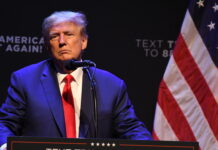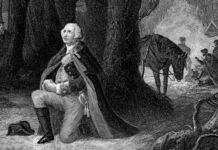Liberty Counsel’s 9-0 victory at the U.S. Supreme Court in Shurtleff v. City of Boston issued on May 2, 2022, involving censorship of Christian viewpoints continues to have an impact across the nation regarding flag raisings.
The High Court unanimously ruled that the city of Boston violated the Constitution by censoring a private flag in a public forum open to “all applicants” merely because the application referred to it as a “Christian flag.” The High Court stated that it is not government speech, and because the government admitted it censored the flag because it was referred to as a Christian flag on the application, the censorship was viewpoint discrimination, and there is no Establishment Clause defense.
As a result, various cities are now considering this Supreme Court ruling regarding flag raising.
For example, resolutions to allow for certain ceremonial flags to be flown by the city of Adrian, Michigan during specific times of the year were recently presented to the Adrian City Commission. The first resolution supports the city flying “ceremonial flags for Black History Month, Mental Health Awareness Month, LGBTQAI+ Pride Month, Juneteenth, Hispanic Awareness Month and Native American Heritage Month.” The second resolution supports the city prohibiting “imagery associated with hate groups recognized by the Southern Poverty Law Center and federal government on city property and at official city events.”
Both of the resolutions were approved by Adrian’s Human Relations Commission at its most recent meeting. However, the city attorney recommended the commission not adopt the resolutions, citing “inconsistencies” based upon the Shurtleff decision that reaffirmed the “well-settled law” that a municipality — such as the city of Adrian — cannot attempt to regulate content-based speech.
The attorney explained, “What that means, is that, for instance, while the resolution seeks to allow us to post certain flags, the resolution also seeks to dissuade us or prohibit us from displaying certain flags. That is the inconsistency. That is what would get the city of Adrian into trouble and into federal court very, very quickly. Because, I hate to say, one person’s speech that may be associated with hate is not another person’s theory on the same side.”
The city attorney is correct. If the city passes this blatantly incantational policy, the city will suffer the same fate as Boston.
Liberty Counsel represented Boston resident Hal Shurtleff and his Christian civic organization, Camp Constitution. Shurtleff and Camp Constitution first asked the city in 2017 for a permit to raise the Christian flag on Boston City Hall flagpoles to commemorate Constitution Day and Citizenship Day (September 17) and the civic and cultural contributions of the Christian community to the City of Boston, the Commonwealth of Massachusetts, religious tolerance, the Rule of Law and the U.S. Constitution.
There are three flagpoles outside City Hall that fly the U.S., Massachusetts and Boston flags, plus a fourth flag on Congress Street, which runs parallel to City Hall. For 12 years from 2005-2017, Boston approved 284 flag-raisings by private organizations with no denials on the flagpoles that it designated as a “public forum.” Had the flag been referred to as anything but Christian, the city would have approved it. The flag itself was not the problem; it was the word “Christian” describing it in the application that was the issue. The year before Camp Constitution’s application (2016-2017), Boston approved 39 private flag-raising events, which averaged three per month. In 2018, Boston approved 50 private flag raising events, averaging nearly one per week. One included a flag of a private credit union.
Justice Stephen Breyer wrote the opinion in which Chief Justice Roberts, Sotomayor, Kagan, Kavanaugh, and Barrett joined. Justice Kavanaugh filed a concurring opinion. Justice Alito filed a concurring opinion in the judgment, in which Thomas and Gorsuch joined. Justice Gorsuch filed a concurring opinion in the judgment, in which Thomas joined.
The High Court wrote that “Boston’s refusal to let Shurtleff and Camp Constitution raise their flag based on its religious viewpoint ‘abridg[ed]’ their ‘freedom of speech.’”
In addition, the Court wrote, that Boston’s “refusal discriminated based on religious viewpoint and violated the Free Speech Clause’” (emphasis added).
Liberty Counsel’s Founder and Chairman Mat Staver said, “This 9-0 decision from the Supreme Court involving the Christian flag continues to have an impact across the nation. The clear message from the Supreme Court is that government must not discriminate based on viewpoint. The government cannot favor one viewpoint and censor another and cannot censor religious viewpoints under the guise of government speech. Any governments that are ignoring this ruling are setting themselves up for potential lawsuits.”
















